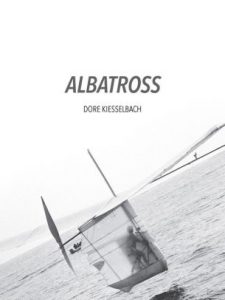
Published by the University of Pittsburgh Press
Dore Kiesselbach’s second collection of poetry, Albatross, often occupies violent subjects(familial trauma, deathly accidents, September 11th, and a shooting), but Kiesselbach is able to juxtapose that darkness with delight and surprise to craft entertaining poems.
“Bob,” is a narrative poem that details a childhood memory of a gas station clerk. The speaker, dealing with a broken family and stuck in “a loneliness economy,” fills the absence of meaningful connections at home with the clerk. At the poem’s core is a serious sadness, but it is combated with humor, “though twice / or so, too embarrassed and young / to pay, I stuffed a Hustler down / my shirt,” and the final lines, “Like a piglet with an ape you / take your family where you can find it.”
The poems can feel distant at times, yet the speaker creates intimacy by possessing tenderness and care in their interactions with other creatures. For instance, in a series of poems about car accidents and death, there is the poem “Hunt and Peck,” which features a speaker that, while driving a semi, hits a bird out of a tree, collects the bird, takes it home, and cares for it, offering it “cold-stunned / mealworms it won’t / eat,” while the speaker stands in the hall, “at first / that is, then sit, knees / pulled up to [the] chest.” And in the poem “Hit and Run,” the speaker witnesses a man who has been hit by a car, and his skull had been broken open, and the poem ends with the lines “the inside of your head / has unmatched beauty.”
The speaker in these poems, like the metaphor for the albatross, feels burdened, burdened by a curse caused by trauma, violence, and existence. The author’s notes reveal that the albatross of the book’s title and poem refers to the Gossamer Albatross, “a seventy-pound, human-powered aircraft,” which appears in the title poem, “someone crossed a wider / Channel on a bicycle with wings.” However, the metaphorical albatross is still very much present in this poem as well as throughout the collection—”Only / while maneuvering to board a water- / companion and give up the attempt / did he find the fluency he needed to go on.”—Drew Cannedy